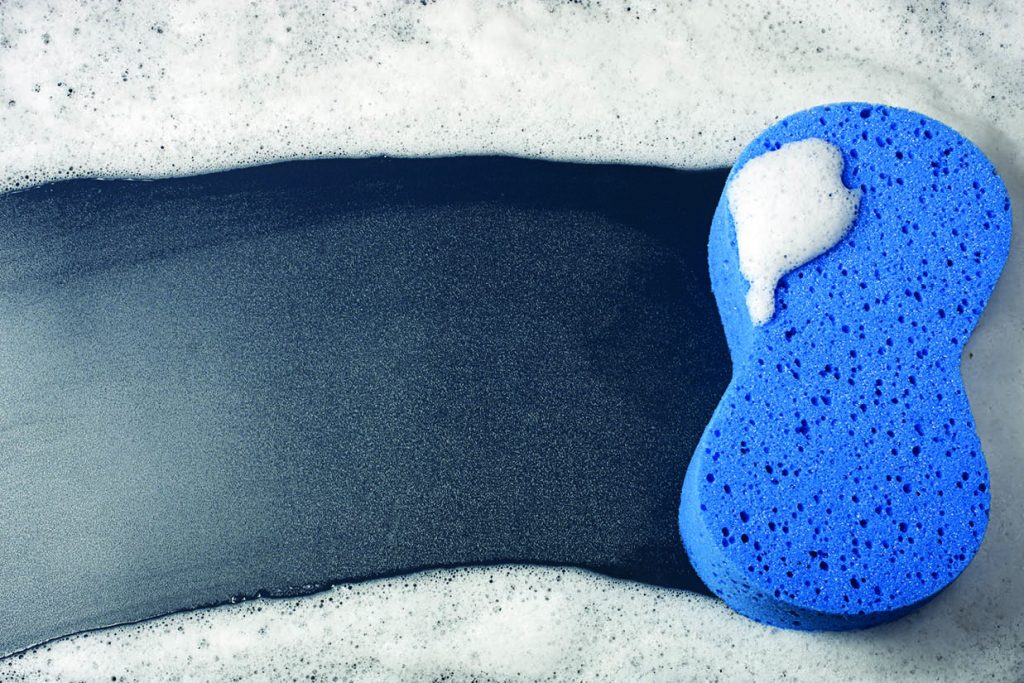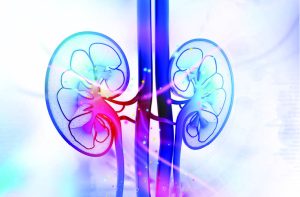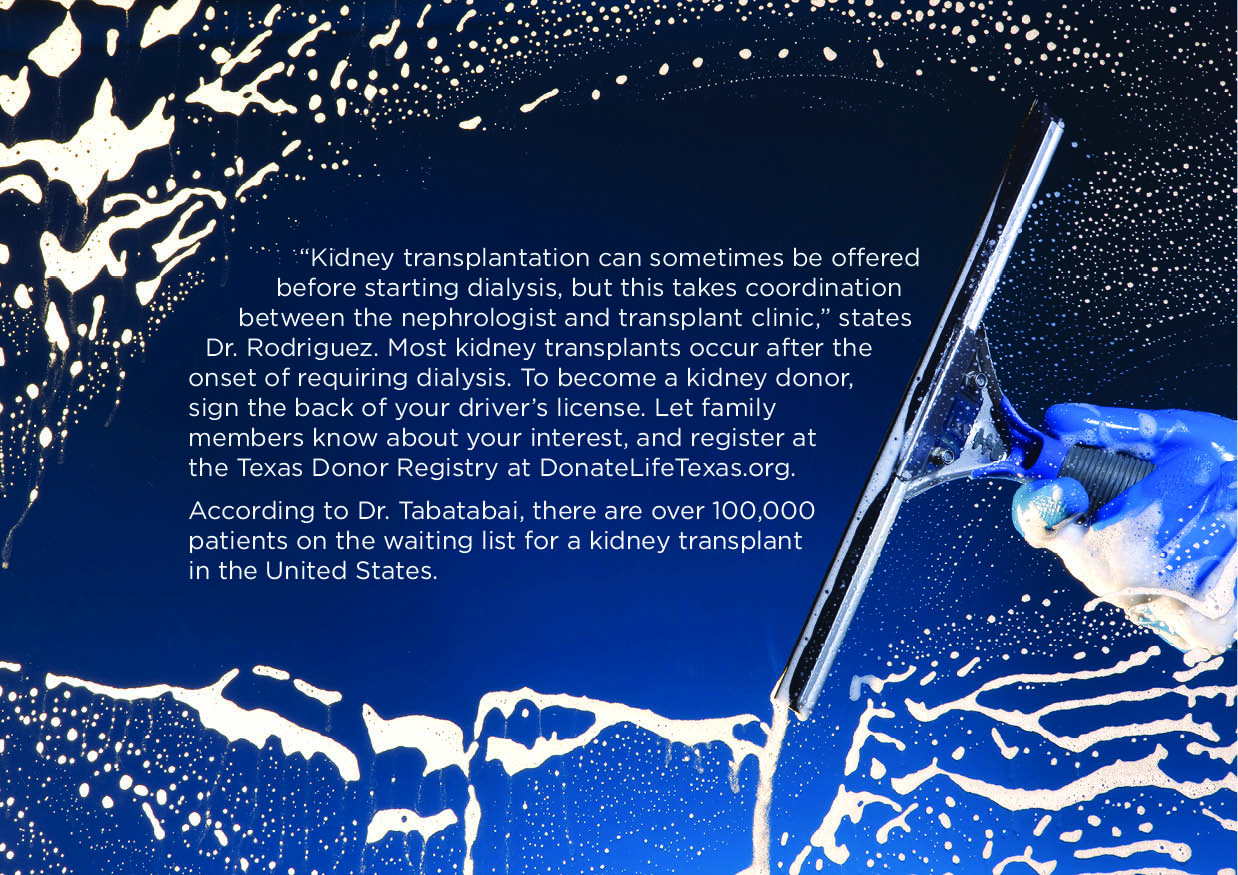Our kidneys keep everything clean
 How much do you know about kidney wellness? Chances are, not very much. Doctors say the misunderstanding is complicated by the lack of symptoms for kidney disease. Before exploring the illnesses, it is important to first explain how kidneys maintain life.
How much do you know about kidney wellness? Chances are, not very much. Doctors say the misunderstanding is complicated by the lack of symptoms for kidney disease. Before exploring the illnesses, it is important to first explain how kidneys maintain life.
The abdominally located, bean-shaped organs filter blood, remove waste products, and wick away excess salt from the body, as well as transfer water to the bladder. “When one does not drink enough fluids, the brain signals the kidneys to hold on to water to prevent dehydration,” says Jack Moncrief, MD, of Jack Moncrief Group PA in Austin.
If the kidneys become diseased, you can have problems with fluid retention and build up of waste products from the body, points out William Rodriguez, MD, of Austin Kidney Associates. One simple way to keep our kidneys healthy is to keep hydrated.
“Here in Texas, we see a lot of patients with chronic dehydration due to our hot climate, and most people simply do not drink enough fluids over the course of a day,” says Sayed Tabatabai, MD, of San Antonio Kidney Disease Center. Dr. Tabatabai recommends about six to eight 8-ounce glasses of healthy fluids daily and points out that athletes definitely need more.
However, the kidneys have other important functions aside from regulating the amount of water in our bodies. They also regulate levels of hormones and help control blood pressure. Doctors say that another reason kidneys may be misunderstood or even ignored is because they are silent, unlike the heart and intestines, which make noise.
 Many kidney conditions are preventable. “Children should be taught to start eating balanced, healthy meals at a young age. A lot of our medical problems as adults stem from poor dietary habits that we learn when we’re young. High salt and sugar consumption over time can predispose people to high blood pressure and diabetes. Exercise is also a vital part of staying healthy, and can minimize long term risk factors as an adult,” explains Dr. Rodriguez.
Many kidney conditions are preventable. “Children should be taught to start eating balanced, healthy meals at a young age. A lot of our medical problems as adults stem from poor dietary habits that we learn when we’re young. High salt and sugar consumption over time can predispose people to high blood pressure and diabetes. Exercise is also a vital part of staying healthy, and can minimize long term risk factors as an adult,” explains Dr. Rodriguez.
Diabetes and high blood pressure are the most common causes of kidney disease. Dr. Rodriguez adds that smoking may lead to kidney disease by damaging the tiny blood vessels that make up the kidneys.
Prescription and over-the-counter drugs also can also be detrimental to the kidneys if not taken properly. “Stay away from excessive use of any medications, particularly anti-inflammatory medicines like ibuprofen,” warns Dr. Moncrief. Blood and urine tests as part of an annual physical are essential in the early screening of kidney disease. “If one waits for symptoms, it is probably too late for any treatment,” he adds.
Dr. Tabatabai makes this point even more poignant. “It is possible to have lost anywhere from 80 to 90 percent of your kidney function while still exhibiting minimal—if any—symptoms,” he points out.
Recent advances in treating kidney illness include new medications to help treat sodium disorders, immune-system diseases, and anemia associated with kidney conditions. New developments in transplantation and innovations in dialysis are also being created—meaning the future for our kidneys is a bright one.
Symptomatic Suffering
One common kidney ailment that definitely shows symptoms is kidney stones. The small stones form inside the kidneys when minerals and waste products harden and form crystals. They are usually carried out with the urine and cause severe pain. According to Dr. Tabatabai, about one in eleven people get a kidney stone during their lifetime.
Other illnesses include kidney infections, which are often treated with antibiotics and hydration. A serious symptom of kidney disease is blood or protein in the urine, which can be the result of kidney cancer. Kidney disease may sometimes be genetic and therefore not preventable.
Diabetes, one of the most common causes of kidney failure, can be avoided through proper diet, weight loss, refraining from smoking, and exercise. “Diabetes is an epidemic in America,” explains Dr. Tabatabai. High blood sugar narrows the kidney’s blood vessels, resulting in higher blood pressure.
While the physicians who were interviewed for this story are board certified in nephrology, the medical specialty that studies the kidneys, this article is not intended to diagnose or treat any conditions. Readers should consult their doctors for specific questions or issues.

By Perla Sarabia Johnson









